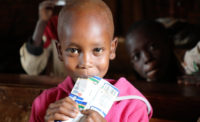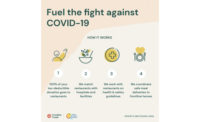Good deeds
Kerry Group partners with NGO to feed Honduran children
Not only will the program improve the quality and nutritional values of the school meals diet, but also the livelihoods of dairy farmers.

Michael Creed (left), Minister for Agriculture, Food & The Marine, is at the launch of Kerry Group’s partnership with the World Food Program. With him are (from left): Stan McCarthy, Kerry Group Chief Executive; Greg Barrow, Head of WFP’s UK and Ireland Office; and Edmond Scanlon, Kerry Group Chief Executive Designate.
The Kerry Group of Tralee, Ireland, has formed a partnership with the World Food Program in Honduras to improve dairy farming efficiencies and the livelihoods of participating farmers while introducing nutrients into the diets of schoolchildren.
The World Food Program has been working in Honduras since the 1970s on malnutrition-related programs, including one aimed at school meals called the Home Grown School Meals Program, said Frank Hayes, director of corporate affairs for the Kerry Group. His company is contributing $750,000 over three years to a pilot program known as “Project Leche,” aimed at informing farmers about sustainable dairy production and influencing the strategy and development of the school meals program, while educating teachers, parents and children.
Farmers in Honduras face recurrent natural disasters, impacts of climate change and weather extremes like prolonged drought and hurricanes, notes the Kerry Group, which considers Project Leche to be part of its broader sustainability effort known as Towards 2020.
“One of the gaps [World Food Program] identified is that while there are many small dairy farmers, there are real difficulties in introducing adequate dairy products into the diet, in particular in the school meals program,” he said. “This would have a dual effect: It would improve the livelihoods of farmers, not only supplying meals but building upon efficiencies so they will have increased output to sell into local markets. The second and most important output is to significantly improve the quality and nutritional values of the school meals diet.”
Agriculturalists from the Kerry Group will engage at the farm level, in conjunction with state authorities and World Food Program representatives, to improve efficiencies based on best practices with regard to dairy production, while the company’s nutritionists will work with those same partners to influence the school nutrition program, Hayes said.
“It is hoped that this will set the standard for integration of dairy products into such programs,” he said. “It may certainly influence the adoption of other such programs around the world.”
Kerry Group, a business-to-business technology company that works with major food manufacturers and food service companies, has no commercial interest in Honduras, Hayes said. “A central tenet of the Kerry Group sustainability program is to work with international agencies to improve nutrition, and particularly in the developing world, to assist in overcoming malnutrition,” he said. “This is a [corporate social responsibility] objective.”
Looking for a reprint of this article?
From high-res PDFs to custom plaques, order your copy today!








